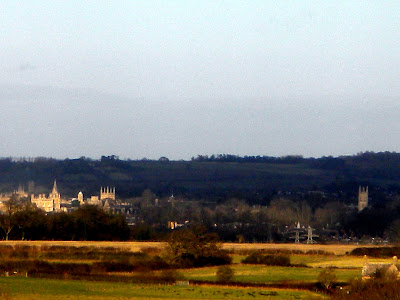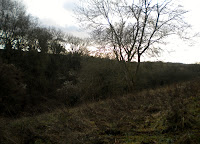The Oxford Country - Chapter Nine in Thomas's 'OXFORD'.

I wrote in the 26th October blog about Thomas's book, 'Oxford', written to accompany paintings of the city. I was not enthusiastic about the book and I just found a letter in which ET himself says,
'Most of it is dull or dribbling.' Always his own harshest critic.
There is a chapter that I really do like - that on the country around the city. My plan is to look more carefully at it over the next few days and see if I can follow some of the paths he mentions. They are not traced consistently and logically like a guidebook but poetically, glimpsed and left for something else, or places are treated collectively:
'And how well a conversation would grow and blossom between Headington and Wheatley or Osney and Eaton!'
He has an epigram from Matthew Arnold's Scholar Gypsy at the beginning: And the eye travels down to Oxford's towers. He nowhere turns his back on the city or rejects it - the country spills into the city with toadflax and wallflowers on the walls, and the city is reflected in the country by examples of architecture, by graves of what were once eminent scholars in country churchyards but above all by the views of the spires. 'They give that mild, well-sculptured country a soul.'
Even when the city can't be seen:
'It is, on all our walks, "like some grave thought threading a mighty dream." '
(I have yet to track down the source of that quotation.)
Here is a walk I do know, some of which I did today:
 |
| Chilswell Valley |
| 1910 |
(where the scent of wallflower and hawthorn comes in
through the window with the sound of the rain and the
nightingale) ; and then away, skirting Wootton and
Cumnor, past the " Bear " (with its cool flagged room
looking on a field of gold, and Cumnor Church tower
among elms) ; and back over the Hurst, where he
turns, under the seven firs and solitary elm, to ponder
the long, alluring view towards Stanton Harcourt and
Bablock Hythe. He may take that walk many times,
or wish to take it, and yet never touch the same foot-
paths ; and never be sure of the waste patch of blue-
bell and furze, haunted by linnet and whinchat ; the
newly harrowed field, where the stones shine like ivory
after rain ; the green lane, where the beech leaves lie in
February, and rise out of the snow, untouched by it,
in polished amber ; the orchard, where the grass is
gloomy in April with the shadow of bright cherry
flowers. '
 |
| From Boar's Hill |
 |
| Today it was very muddy! |
Here is another walk from 'Oxford' which I can't recognise at the moment; of course it may not actually exist as a single entity at all.
'One such footpath I remember, that could be seen
falling among woods and rising over hills, faint and
winding, and disappearing at last, like a vision of the
perfect quiet life. We started once along it, over one
of the many fair little Oxford bridges, one that cleared
the stream in three graceful leaps of arching stone.
The hills were cloudy with woods in the heat. On
either hand, at long distances apart, lay little grey
houses under scalloped capes of thatch, and here and
there white houses, like children of that sweet land
albi circum ubera nati.
For the most part we saw only
the great hawthorn hedge, which gave us the sense of a
companion always abreast of us, yet always cool and
fresh as if just setting out. It was cooler when a red-
hot bicyclist passed by. A sombre river, noiselessly
sauntering seaward, far away dropped with a murmur,
among leaves, into a pool. That sound alone made
tremble the glassy dome of silence that extended miles
on miles. All things were lightly powdered with gold,
by a lustre that seemed to have been sifted through
gauze. The hazy sky, striving to be blue, was reflected
as purple in the waters. There, too, sunken and
motionless, lay amber willow leaves ; some floated
down. Between the sailing leaves, against the false
sky, hung the willow shadows, shadows of willows
overhead, with waving foliage, like the train of a bird
of paradise. Everywhere the languid perfumes of
corruption. Brown leaves laid their fingers on the
cheek as they fell ; and here and there the hoary
reverse of a willow leaf gleamed in the crannied bases
of the trees. A plough, planted in mid-field, was
curved like the wings of a bird alighting. '
ET, 'Oxford', 1903.


No comments:
Post a Comment